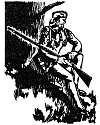 Washington possessed the faculty of approaching War, even then, on
a scientific basis. In fact, he was probably one of the first soldiers
to recognize the value of camouflage. In order to utilize his
comparatively small force of men to the best advantage, he specialized
in guerrilla warfare. He was quick to realize the superior quali ties
of the buckskin hunting shirts as a uniform for they blended so well
with the underbrush. In contrast there were no better targets than a
company of Hessian soldiers in their bright red uniforms marching along
in military order.
Washington possessed the faculty of approaching War, even then, on
a scientific basis. In fact, he was probably one of the first soldiers
to recognize the value of camouflage. In order to utilize his
comparatively small force of men to the best advantage, he specialized
in guerrilla warfare. He was quick to realize the superior quali ties
of the buckskin hunting shirts as a uniform for they blended so well
with the underbrush. In contrast there were no better targets than a
company of Hessian soldiers in their bright red uniforms marching along
in military order.But camouflage was not the only modern weapon Washington used in his warfare - he even included the submarine in his experimental tactics. One morning in 1776, some British soldiers stationed at Governor's Island were mystified by what appeared to be a large metal object equipped with windows floating towards Admiral Howes' flagship, the "Eagle." As they got out a boat to investigate, the metal object withdrew but left floating on the tide what looked like a very large egg. Soon there was a tremendous roar - the "egg" had exploded. The large metal object was probably the first military submarine and the "egg" was a time-bomb containing 130 pounds of powder. |








